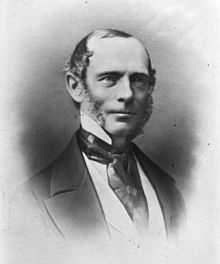| Sir Henry ParkerKCMG | |
|---|---|
 | |
| 3rd Premier of New South Wales | |
| In office 3 October 1856 – 7 September 1857 | |
| Monarch | Victoria |
| Governor | Sir William Denison |
| Preceded by | Charles Cowper |
| Succeeded by | Charles Cowper |
| Personal details | |
| Born | Henry Watson Parker (1808-06-01)1 June 1808 Lewisham, Kent, England, UK |
| Died | 2 February 1881(1881-02-02) (aged 72) Richmond, Surrey, England, UK |
| Spouse | Emmeline Emily Macarthur |
Sir Henry Watson Parker, KCMG (1 June 1808 – 2 February 1881) was Premier of New South Wales. He fitted into colonial society and politics in the era before responsible government, but his style was not suited to the democratic politics that began to develop in 1856.
Biography
Parker was the fourth son of Thomas Watson Parker and his wife Mary, née Cornell, of Lewisham, Kent, England. In order to improve his poor health, he joined the British East India Company and travelled to India, China and the Cape of Good Hope. Subsequently he toured France, Holland and Belgium, before securing employment in 1837 as private secretary to Sir George Gipps. In 1838 in this capacity he accompanied Gipps, now the incoming colonial Governor, to the Colony of New South Wales. In 1843 Parker married Emmeline Emily, third daughter of John Macarthur, which further linked him to the conservative colonial establishment.
In 1846 he was nominated by Gipps to become a member of the Legislative Council. In May of that year he was elected Chairman of Committees (Deputy presiding officer of the upper house) at a salary of £250 (raised to £500 in 1853), and continued to be re-elected to this position until the introduction of responsible government in 1856.
Parker was elected as member for Parramatta in the first Legislative Assembly and was a candidate for the speakership in May, but was defeated by one vote, with Daniel Cooper being elected. In September 1856 John Hay carried a vote of no-confidence in the Cowper ministry. He recommended to Governor William Denison that Parker would be the most likely man to conciliate parties, and that he should be asked to form a coalition government.
Premier
Parker offered seats in the cabinet to Cowper and Stuart Donaldson, the preceding premiers, but Cowper declined. In March 1857 Parker passed an act re-establishing the Sydney municipal council, and other useful legislation was also passed. It had been intended to bring in a land bill but the government was defeated on its electoral bill, and Parker resigned on 4 September 1857. In 1858 he returned to England. He does not appear to have ever revisited Australia, and died at Richmond, London, in 1881. He was survived by his wife, without issue, and left an estate of £140,000.
Honours
Parker was knighted in 1858 and created Knight Commander of the Order of St Michael and St George in 1877.
See also
Notes
- ^ Nairn, Bede. "Parker, Sir Henry Watson (1808–1881)". Australian Dictionary of Biography. Canberra: National Centre of Biography, Australian National University. ISBN 978-0-522-84459-7. ISSN 1833-7538. OCLC 70677943. Retrieved 26 February 2007.
- ^ Serle, Percival. "Parker, Sir Henry Watson (1808–1881)". Dictionary of Australian Biography. Project Gutenberg Australia. Retrieved 26 February 2007.
- "Sir Henry Watson Parker (1808–1881)". Former members of the Parliament of New South Wales. Retrieved 11 May 2019.
| Political offices | ||
|---|---|---|
| Preceded byCharles Cowper | Premier of New South Wales 1856–1857 |
Succeeded byCharles Cowper |
| New South Wales Legislative Assembly | ||
| Preceded byNew seat | Member for Parramatta 1856–1857 Served alongside: Oakes |
Succeeded byJames Byrnes |